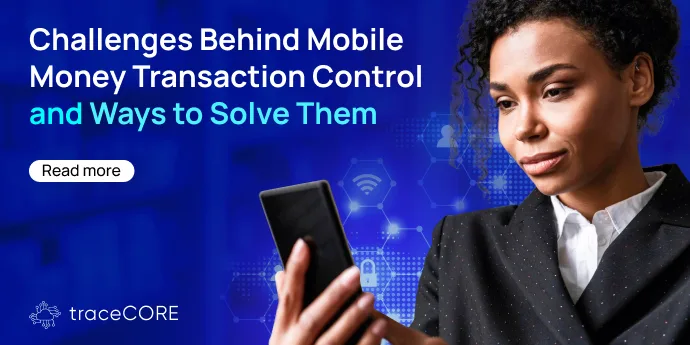Mobile Transaction Tracking
Half the World’s Mobile Wallets Are in Sub-Saharan Africa — Here’s Why That Matters

The digital payments landscape is undergoing a profound transformation — and nowhere more so than in Sub‑Saharan Africa. According to the latest industry data from the GSMA, the region now hosts roughly 48% of all registered mobile-money accounts worldwide — approximately 840 million. With mobile wallets and digital transfers increasingly substituting for cash and traditional banking, the potential for financial inclusion, economic growth and innovation in the region is huge.
But with rapid growth come serious challenges — particularly for governments, regulators and authorities trying to ensure safety, transparency, taxation and financial integrity.
In this post, we’ll explore what mobile money’s dominance in Sub-Saharan Africa means: the benefits it brings to a developing-economy context, the risks and regulatory challenges it poses, and how technology solutions such as traceCORE Mobile Transaction Tracking can help governments navigate this new terrain.
What Is Mobile Money?
Mobile money is a digital financial service that allows people to store, send, and receive money using a mobile phone, even if they don’t have a traditional bank account.
It’s simple, fast, and often more accessible, especially in regions where banking infrastructure is limited.

How Does Mobile Money Work?
Step 1: Registration
A user signs up for a mobile money account with a telecom provider or mobile money operator (like M-Pesa, MTN MoMo, Airtel Money, etc.), usually using a SIM card and ID.
Step 2: Deposit
Users deposit cash at a local mobile money agent — often a shopkeeper or kiosk — who converts the cash into electronic value (e-money) in their account.
Step 3: Transaction
Once funds are in the mobile wallet, users can send money to other people, pay bills, receive salaries or government payments, buy goods or services from merchants, and withdraw cash from agents if needed.
Benefits of Mobile Money in Sub-Saharan Africa

Rapid Development of Financial Inclusion
-
According to the GSMA, Sub-Saharan Africa’s share of registered mobile-money accounts increased to 48% of the global total in 2023.
-
Fintech News Africa reports that about 40% of adults in Sub-Saharan Africa had a mobile-money account in 2024, up from 27% in 2021.
-
The IMF discovered that in several sub-Saharan Africa economies, mobile money accounts now exceed traditional deposit‐account penetration.

Access to Formal Financial Services
-
In 2024, around 23% of adults in Sub-Saharan Africa saved money via mobile money accounts, compared to only ~9% in low-/middle-income countries generally, according to the World Bank.
-
Fintech News Africa highlights that mobile money is emerging as “first access” for many previously unbanked people. In many markets, people hold mobile wallet accounts but no bank account.

Economic Growth and Transaction Volumes
-
A 2025 industry report by the GSMA states that mobile money handled ~$1.105 trillion in 2024 in Africa — accounting for ~65% of global mobile-money transaction value.
-
According to the same report, in 2024, the number of registered mobile money agents reached 28 million, marking a 20% jump from the previous year. The surge was driven primarily by Sub-Saharan Africa, which accounted for 77% of the total growth.

Reaching Rural and Underserved Populations
-
The GSMA also notes that mobile money agents and mobile networks allow access in geographic areas where banks may lack presence.
-
For low-income or informal-sector workers, mobile money provides a far more convenient and often cheaper way to move funds, pay bills, send remittances and build a transaction history.
In short: for many households, entrepreneurs, informal workers and small businesses in Sub-Saharan Africa, mobile money is not just a convenience — it’s a gateway to formal financial services, economic participation and digital inclusion.
While the benefits are considerable, this massive growth also creates a set of pressing regulatory, fiscal and operational challenges — especially for developing economies.
The Challenges Mobile Money Poses for Governments and Regulators
Financial Integrity Risks
The IMF points out that digital payment innovations in Sub-Saharan Africa face elevated risks of financial integrity problems, given weaker regulatory capacity, informal sectors, cross-border flows and fast-moving fintech platforms.
Digital Illiteracy and Access Inequality
Although access is broadening, the GSMA notes that many users still face hurdles, such as lack of formal ID, limited digital literacy, weak connectivity, agent network deserts in remote zones, and less coverage for merchant payments versus simple peer transfers.
Financial Stability Concerns
In some cases, widespread mobile money adoption could affect deposit bases, credit intermediation or influence currency substitution if foreign-currency wallets or parallel systems develop.
The IMF warns of possible impacts on monetary transmission in some countries.
Fiscal Tracking and the Informal Economy
As funds move in mobile money circuits rather than cash, governments have an opportunity to widen tax bases — but only if they can trace transactions, according to the GSMA.
If mobile money flows remain opaque, tax leakage remains high and fiscal policy control is weakened.
Network and Infrastructure Vulnerability
As mobile money ecosystems scale, agent networks expand and fraud vectors proliferate.
According to Telecom Review Africa, telecom and fintech industry reports highlight that weak KYC (Know Your Customer), SIM-swap attacks, agent collusion and inadequate cyber-infrastructure are major concerns.
Regulatory and Legislative Gaps
The IMF highlights that many countries in Sub-Saharan Africa lack comprehensive regulatory frameworks for mobile money, especially when provider networks cross national borders, or when the lines blur between telecom, banking, agent networks and fintech.
The lack of standardized rules, weak capacity and slow cross-border cooperation hamper oversight.
It’s clear that governments and regulators have to take action. For sustainable growth and financial-system integrity, oversight, traceability and the right technological enablers are essential.
The Solution: a Traceable and Monitored Mobile Money Ecosystem
Given the scale and complexity of mobile money operations in Sub-Saharan Africa, tracking and monitoring transactions becomes vital — both for promoting transparency and for avoiding systemic risks.
A traceable ecosystem helps:
-
Ensure that digital payment flows are declared, taxed and visible to fiscal authorities.
-
Uphold Know Your Customer (KYC), anti-money laundering (AML) and counter-terrorist financing (CTF) rules.
-
Improve agent network oversight, reduce fraud, collusion or “ghost” agent problems.
-
Enable regulators and central banks to monitor real-time flows, detect anomalies and enforce compliance.
-
Support digital inclusion objectives while maintaining financial system safety and resilience.
One solution designed for exactly this space is traceCORE Mobile Transaction Tracking.
It offers governments and regulators a technology stack to monitor, trace and audit mobile money transactions — enabling them to strike the balance between enabling financial inclusion and maintaining system integrity.
How traceCORE Mobile Transaction Tracking Helps Governments Worldwide
Real-Time Transaction Monitoring
Authorities can track transaction flows across wallets, agents, corporates and peer-to-peer transfers, gaining visibility into volumes, patterns and anomalies.
Agent Network Oversight
Identify active versus inactive agents, detect suspicious behavior (e.g., unusually large transactions, repeated rapid transfers), and audit the agent ecosystem.
Regulatory Compliance Dashboard
Enables regulators to enforce limits, flag suspicious activity, generate reports for AML/CTF, tax auditing, and policy analysis.
Interoperability and Data Integration
Integrates with mobile money platforms, telecom operators, banking systems and regulatory databases — facilitating a unified oversight framework.
Customer Onboarding Support
Helps link accounts to verified identities, monitor onboarding flows, reduce duplicate or “ghost” wallets.
Scalability for High-Volume Markets
With millions of accounts and hundreds of millions of transactions per year, the system is built for scale — making it suited to entire national ecosystems.
For governments in Sub-Saharan Africa confronting the goals of expanding inclusion and securing the digital money ecosystem, traceCORE offers a credible tool to ensure mobile money remains a force for growth, not risk.
Conclusion
The rise of mobile money in Sub-Saharan Africa is one of the most important financial innovation stories of our time. With roughly half the world’s mobile-money accounts now located in the region, the implications for inclusion and economic transformation are substantial. Yet, the benefits won’t automatically translate into sustainable development or fiscal strength unless the flows are transparent, risks are managed and regulatory frameworks are robust.
For governments and regulators, the message is clear: mobile money offers enormous promise — but only if the ecosystem is traceable, monitored and embedded in a broader strategy of digital-finance regulation. Solutions like traceCORE Mobile Transaction Tracking provide the kind of visibility and control that can enable mobile money to fulfil its potential — rather than undermine it.
In short: for Sub-Saharan Africa, mobile money isn’t the endgame — it’s the platform. What matters next is how the region governs, monitors and evolves that platform so it drives inclusive growth, fiscal sustainability and financial-system resilience.
Related Posts
All postsChallenges Behind Mobile Money Transaction Control and Ways to Solve Them
Governments worldwide face various challenges due to uncontrolled mobile money transactions. Read this post to learn more about those challenges and how traceCORE Mobile Transaction Tracking can help overcome them.

